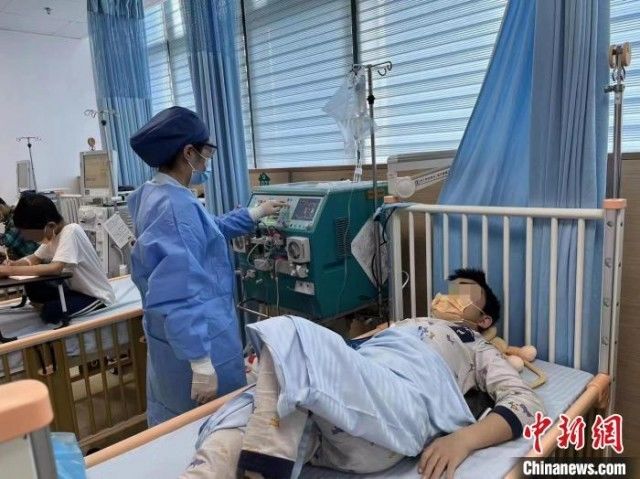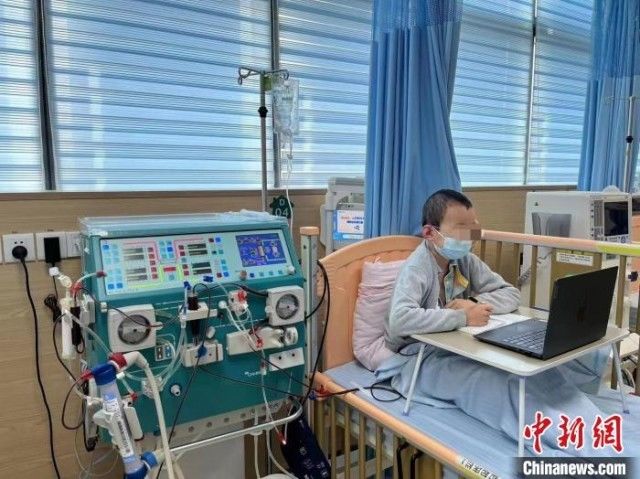
The hospital admitted all children on hemodialysis to the hospital for management, and achieved “no less than one”. Photo courtesy of Pediatric Hospital
China News Service, Shanghai, April 26 (Reporter Chen Jing) “Dr. Zhang, Dr. Zhang, I have completed hemodialysis, and my weight is now 26.6 kg.” Rui Rui (pseudonym), a 14-year-old boy with uremia, reported himself to the attending physician Zhang Zhiqing after hemodialysis in the National Children’s Medical Center and the Pediatric Hospital Affiliated to Fudan University (hereinafter referred to as the Pediatric Hospital). weight.
The reporter learned on the 26th that the pediatric hospital adopts the “in-hospital model” and “full-time management”, and makes every effort to ensure that medical treatment is not dropped, and it also strives to create a life channel to protect children with chronic diseases. Rui Rui, who originally had to go back and forth to the hospital for hemodialysis three or four times a week, was as lucky as other hemodialysis children and did not miss a dialysis due to the epidemic lockdown.
According to reports, on March 27, just one day before the closure and control began with the Huangpu River as the boundary, Rui Rui came from Pudong and was admitted to the ward of the Children’s Hospital Affiliated to Fudan University. He has been in the ward for a whole month. Safely receive treatment, study online, and play with patients.
In mid to late March, according to the requirements of epidemic prevention and control, the inpatient building of the Pediatric Hospital was temporarily closed. However, the blood purification center that receives children with chronic hemodialysis every day is located in the inpatient building. These children are scattered in Minhang, Jing’an, Jinshan, Putuo and Pudong.
Hemodialysis is their “lifeline”! If dialysis is not performed on time, they will be life-threatening at any time due to fluid overload, hyperkalemia, toxin accumulation, etc. Professor Xu Hong, Secretary of the Party Committee of the Pediatric Hospital, instructed Shen Qian, Director of the Department of Nephrology: “We are the designated dialysis center for these children. We have a responsibility and must arrange for them to continue their treatment!” A love relay for the children on hemodialysis immediately started.

The child receives treatment in the ward, learns online classes and plays with patients. Photo courtesy of Pediatric Hospital
Before kidney transplantation, home peritoneal dialysis and hemodialysis are the two main methods of renal replacement therapy for children with uremia. About 90% of the children on uremic dialysis who were followed up by the Department of Nephrology of the Children’s Hospital of Fudan University, National Children’s Medical Center, received automatic peritoneal dialysis at home. “One out of 10 children choose hemodialysis treatment due to various factors. We must ensure that all children on hemodialysis can receive treatment on time.” Shen Qian said, in order to minimize the impact of epidemic prevention and control, and to protect hemodialysis patients The treatment of the children was not interrupted. After the inpatient building was unblocked, the hospital admitted all the children on hemodialysis to the hospital for management, and achieved “no less than one”. Rui Rui returned to the pediatric hospital and was hospitalized for treatment like other children on hemodialysis.
What about children with uremia and other chronic kidney disease, except children on hemodialysis? It is understood that during the epidemic prevention and control period, the treatment team of the Nephrology Department of the Pediatric Hospital, according to the different conditions of the children, carried out one person, one policy, and full-time management through various channels.
In the Pediatric Hospital Internet Hospital and in the patient WeChat group, the management team of children with chronic kidney disease will arrange shifts to provide guidance on the questions of the parents of children; , the treatment team provides professional guidance programs online by instructing family members to conduct targeted examinations for children in local hospitals. The Department of Nephrology has also opened a 24-hour on-duty telephone to provide emergency consultation and guidance to parents of children across China at any time. (End)